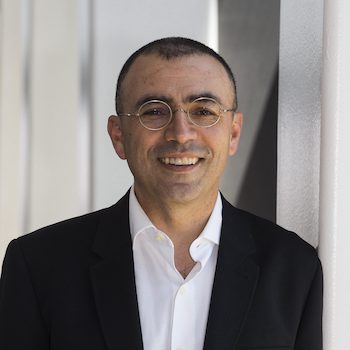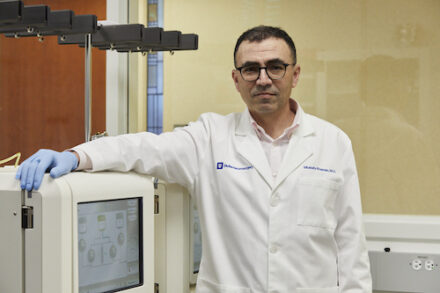
Dr. Khasraw’s is a neuro-oncologist, professor of medicine and Deputy Director of the Center for Cancer Immunotherapy at Duke University, USA. He is interested in translating research into new therapies and at Duke, is tasked with speeding up clinical research and translation for scientists across all departments and tumor sites. He leads several clinical and translational programs with significant laboratory collaborations and is the principal investigator on first-in-human Phase I immunotherapy clinical trials in solid tumors. His research interests include biomarker development and design of innovative clinical trials to improve outcomes for patients with primary and metastatic cancers of the central nervous systems.
For me it was the science and the possibility to make a significant difference. I’ve always been fascinated by cancer biology, and I also like things that are more challenging and not straightforward. When I started training in oncology most of these advances we’ve seen over the last decade or so just did not exist — we had the old-fashioned chemotherapy and radiotherapy. So, there were many challenges and opportunities for research. And with brain tumors, compared to other cancers, outcomes for patients are so much worse. Therefore, the chance to contribute — to make a difference — is larger because the need is greater.
Patients go through a very difficult journey, and getting the correct information is not straightforward. It’s very common for patients to have a distorted understanding of reality. They may search online and come up with the wrong or bad information. Providing reliable information is very important. I’ve worked in patient advocacy groups to help make the complex landscape of cancer and available treatments more understandable in lay language in both the US and Australia.
I’ve served in the past as advisor for BCNA (the Breast Cancer Network Australia), the NeuroEndocrine Cancer Australia, formerly UNICORN, and several brain tumor societies, advocacy and funding organizations. I find that work very rewarding because you see how people are touched by just having someone answer their questions and give them the right information — it really makes a big difference.
I also work with patients’ families a great deal — especially with the cancers with a poor prognosis. You not only deal with the patient but with the entire family, the caregivers and everyone else involved. And you also work with your local teams and other providers.
 You are quite involved in clinical trials and especially early-phase trials. Tell us about that work and your involvement.
You are quite involved in clinical trials and especially early-phase trials. Tell us about that work and your involvement.I work at the interface between laboratory science and the clinical trials that take promising treatments to humans, and that’s where most of the interesting discoveries are made. You have the ability to examine biologic endpoints rather than just to answer the question “does the treatment work?”. You can look at whether the treatment gets to the tumor when it’s given — if the activity we’ve seen in the lab can be reproduced in humans — if there are any biologic markers you can measure in the blood or from the tumor samples after the patient receives the treatment. These “on-treatment” biopsies or neoadjuvant treatments or surgical window opportunity studies all allow examining specimens from patients to understand if the drug gets there, when it gets there and if it does what it’s supposed to be doing. Then you can identify the right amount of drug to be given to the patient. Sometimes you find that the drug doesn’t do what it was supposed to do. But you might also find something else interesting. So that’s all very satisfying to understand if the drug works, why it does — and if it doesn’t work, why it doesn’t.
There were many cancers that did not have effective treatments available in the past. But now we see diseases like malignant melanoma or non-small cell lung cancers that have evolved in a way that the classification is very different from before. Just identifying a disease based on the organ of origin is not enough anymore, because that doesn’t explain the biology. For example, not every lung cancer is the same. Some are driven by specific mutations. Some are caused by smoking. Others are not caused by smoking. The way these different types of lung cancer respond to treatment is also very different. And the same thing applies to almost all malignancies since we have learned to classify them based on the genetic makeup rather than just where they come from.
This helps us find more appropriate treatments for each of these subtypes. For some diseases, such as melanoma and non-small cell lung cancer, advancements have been made. But for others, like pancreatic cancer and glioblastoma and others in an unfortunately long list, we still don’t have effective treatments available. But we are learning more about that biology as well, which is encouraging — we are closer to the discovery of more effective treatments for these other diseases.
There have not been and it’s complex — there are many reasons. One is that the brain has evolved to have a protective mechanism called the blood brain barrier and it filters toxins and prevents them from getting to the brain. Also, the immune system inside the brain is unique in keeping immune cells from easily getting to the brain — also for protection. In healthy people, that’s a good thing, because otherwise we would get brain inflammation. But if we want a therapy for brain tumors, we have to overcome those barriers and find a way to get immune cells and drug therapies past the barriers. There are many other reasons for the lack of advancement, but these are probably the two key explanations.
I have lived in Australia, the UK, the Netherlands, Iraqi Kurdistan and of course the US. I guess it gives you a different perspective. We can always keep in mind that no place is perfect. Every environment has its own limitations, and having that perspective helps you to become more pragmatic, and in a way more efficient, in dealing with things. It helps you not to get frustrated easily. And because you’ve seen different aspects of clinical care or research, you expand your horizons and you may come up with better suggestions.
If you compare the different environments, I would say, for example, in the US there are more resources available for research, and there are also large numbers of patients, scientists and clinicians. But the healthcare system in the US is very problematic for many reasons. And there are equity issues and insurance. So that’s what I mean. There are advantages and disadvantages everywhere. No place is perfect.
You can’t really do those trials without scientific input. But it’s not just giving guidance and advice. When scientific leaders are deeply involved, they can stop things that don’t make sense before the trial starts — before the protocol is finalized. Even though a clinical trial protocol is a living document and constantly getting updated and amended, it’s much more important to get as much input as possible early on so that not only the scientific aspect is correct, but also the practical issues. Is the protocol possible from the clinic and the hospital and the patient’s point of view? If the practical aspects are not feasible, you will not get to the answer to your question.
But even though a clinical trial is about finding a new effective treatment, it’s also very important if that treatment doesn’t work to understand why and how we can make the next trial better.
Mainly I know that it’s important to keep a healthy work-life balance. I run and I cycle. I spend time with my two teenaged girls. I read a lot — things outside medicine and science. Recently I’ve gone back to the classics that I read when I was much younger. Something I read 20 years ago — it’s very different now. We all change with time. Right?
2023 ASCO Celebrates Patients at the Cornerstone of Cancer Care and Research